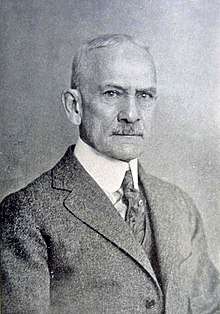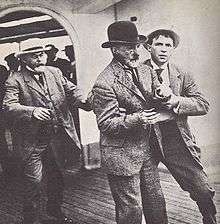Charles Chapin
Charles E. Chapin (October 19, 1858 – December 13, 1930) was a New York editor of Joseph Pulitzer’s Evening World. He was convicted of the murder of his wife and sentenced to a 20-year-to-life term in Sing Sing prison.

Career
Chapin was born in upstate Watertown, New York and began his career on a Kansas newspaper, aged 14, moving later to Chicago to work for the Tribune, where he gained renown as a crime reporter. He excelled sufficiently to be hired in 1898 by the World, a New York daily, run by the Pulitzer family, which enjoyed one of the largest circulations in the country. Chapin became editor of the evening edition of the World and was renowned as a hard taskmaster.[1] He is said to have fired a total of 108 journalists during his tenure – one of them for daring to use the new-fangled word "questionnaire". Among his victims was his own publisher's son.[2]
Opinions of Chapin
For a score of years Chapin was the city editor of Joseph Pulitzer’s Evening World.[3] Many newspapermen considered Chapin to be "the greatest city editor who ever lived". Those who worked for him, however, often hated him. When Irvin S. Cobb, the well-known World reporter, heard that his editor was sick, he is said to have looked up from his work and remarked, "I hope it’s nothing trivial." According to Andy Logan, a noted correspondent to The New Yorker, Chapin was "terrible tempered" and in the opinion of many of his staff had "a legendary imperviousness to human suffering, especially theirs."[4]
Gaynor photograph

One of Chapin's most celebrated coups was the publication of a photograph captured by an Evening World photographer showing the moment when New York mayor William Jay Gaynor was shot by a would-be assassin. William Warnecke, the photographer, who had been lining up a portrait of the mayor, snapped the shutter just as Gaynor crumpled to the ground; Chapin's response, when the developed photo arrived on his desk, was: "Blood all over him! And exclusive, too!"
Wife's murder
Chapin's career in New York newspapers came to an end in September 1918 when, dogged by illness and debt, and concerned for his increasingly fragile wife of 38 years, he shot and killed his spouse while she was sleeping. News of the shooting shocked many of the newsman's colleagues. "They had known he would be involved in a murder some day," as Andy Logan wrote, "but had always assumed he would be the victim."[5] Although he had apparently intended to commit suicide himself following the murder, the famous editor was instead arrested, convicted of the shooting, and sent to Sing Sing prison for a term of 20 years to life. There he wrote a memoir and became renowned for the rose garden he cultivated in the grounds, acquiring the nickname of "The Rose Man." Chapin edited the prison newspaper, The Star of Hope at Sing Sing for a short time.
Death
He died in Sing Sing on December 13, 1930.
References
- Hardboiled Charlie Chapin, Straus News, 16 February, 2015
- Richard F. Snow. Charles Chapin, American Heritage, December 1979, Volume 31, Issue 1
- The Rose Man of Sing Sing, Correctionhistory.org
- "The Gardens." In Morris, James McGrath (2003). The Rose Man of Sing Sing: A True Tale of Life, Murder and Redemption in the Age of Yellow Journalism. New York: Fordham University Press.
- Archives From Prisons in New York Are Digitized, The New York Times, July 6, 2014
Further reading
- Chapin, Charles E. Charles Chapin's Story Written In Sing Sing Prison. New York: G. P. Putnam's sons, 1920.
- Logan, Andy (1970). Against the Evidence: The Becker-Rosenthal Affair. New York: McCall Publishing Company. ISBN 0-8415-0025-8.
- Morris, James McGrath (2003). The Rose Man of Sing Sing: A True Tale of Life, Murder and Redemption in the Age of Yellow Journalism. New York: Fordham University Press. ISBN 0-8232-2267-5